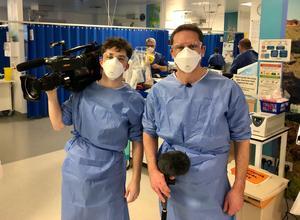NUJ marks International Workers’ Memorial Day
The National Union of Journalists (NUJ) in the UK and Ireland pays tribute to all media workers around the world who have died at work during the last year in commemorations marking International Workers' Memorial Day on Wednesday 28 April 2021.

© Private
The International Federation of Journalists (IFJ) last month reported that 65 journalists and media staff were killed in work-related incidents during 2020. Journalists have also been at the frontline of reporting on the impact of the pandemic in their communities - with many also becoming casualties of the virus.
At least 1,060 media workers have died from covid-19 since 1 March 2020, according to the Press Emblem Campaign, more than half of those lives have been lost in Latin America. March 2021 was the deadliest month yet, with 93 deaths and in Brazil alone a journalist is reportedly dying every day.
The NUJ supports calls made by the International Trade Union Congress for classifying covid-19 as an occupational disease as this would provide enhanced legal protections for workers and enable access to compensation funds for the families of workers who die or are infected with covid-19 at work.
The ITUC is also calling for a massive boost in the production of vaccines against the virus and this must include the removal of all barriers, including intellectual property and profit-gouging, to ensure that vaccines, tests, treatments and other public health tools are available to all, without discrimination.
Journalists are facing the threat of contracting the virus in the course of their work, many are being targeted with threats and violence, with some paying the ultimate price and killed, and media workers can also experience significant mental health problems and suicide. All these factors contribute to the death toll.
The coronavirus pandemic has put media workers under unprecedented strain. From job insecurity to the economic crisis of the media; from increasing polarisation of public discourse to growing attacks from elected officials against journalists; from a relentless breaking news cycle to journalists’ hyperconnectivity - media workers are highly exposed to a variety of health and safety risks.
The NUJ's safety report in 2020 helps to illustrate the range of threats faced by union members when carrying out their work. Increasingly, newsgatherers are also having to contend with threats and abuse in the course of their duties, documenting the impact of the pandemic, and reporting from protests and demonstrations. This is an issue that employers need to step up their risk assessments around and implement protective measures for both staff and freelance teams.
Media workers remain vital within all societies, reporting essential information and news in the public interest. The covid crisis has transformed life as we knew it and during the global health pandemic journalists have clearly demonstrated their key role in the spectrum of essential services. That's why the union has put forward the NUJ News Recovery Plan, setting out a range of key measures to sustain the press and media through the covid-19 crisis and beyond.
Prioritising health and safety at work is a core part of all trade union activity and is why the NUJ has been building a strong network of health and safety reps in workplaces, so we can identify and tackle problems, offer support to colleagues and collectively drive-up standards and conditions at work.
One NUJ health and safety rep said:
"Health and safety reps hold a key position in any workplace. No single manager should have to burden that responsibility alone. As a health and safety rep you bridge a huge gap between those who oversee the job, and the teams on the ground carrying it out. You provide balance and perspective on behalf of the workforce when decisions are being made and policies are written. You know what it's like to do a role and can predict the pitfalls, as well as foreseeable dangers.
"Reps also have a role in protecting NUJ members from themselves by promoting the importance of health and safety at work. People who are keen to impress don't always think about the consequences of their actions. But we don't just work in an advisory capacity. Reps hold legal powers to make sure organisations operate with the highest standards of safety, and we can hold companies to account, if they fall short.
"Finally, we are a protected point of contact for staff, who know they can approach with their concerns, without fear that speaking up could affect their career."
Michelle Stanistreet, NUJ general secretary, said:
"Every year it is a shocking reality that more people are killed at work than in wars. Most don't die of mystery ailments, or in tragic 'accidents' – they die because an employer made choices and decisions that failed to prioritise their safety.
"On International Workers’ Memorial Day we pay tribute to all the colleagues we have lost, to every single media worker whose commitment to their work and to journalism has led them and their families to pay the ultimate price. In their honour and memory we will continue to fight to improve the health and safety at work for all media workers."
